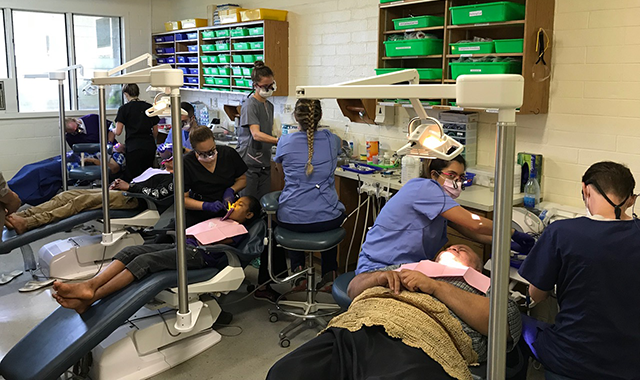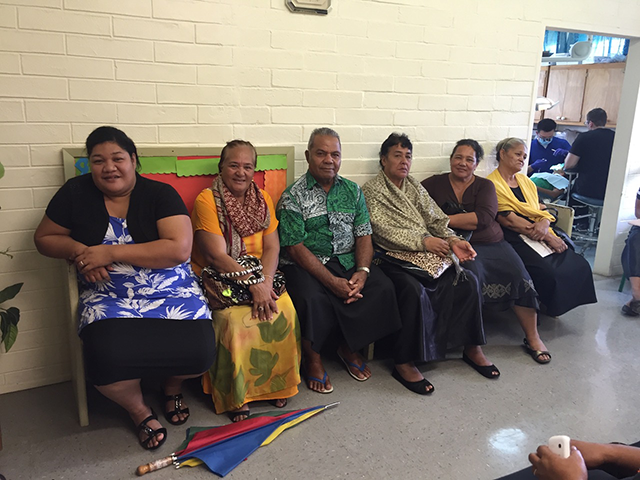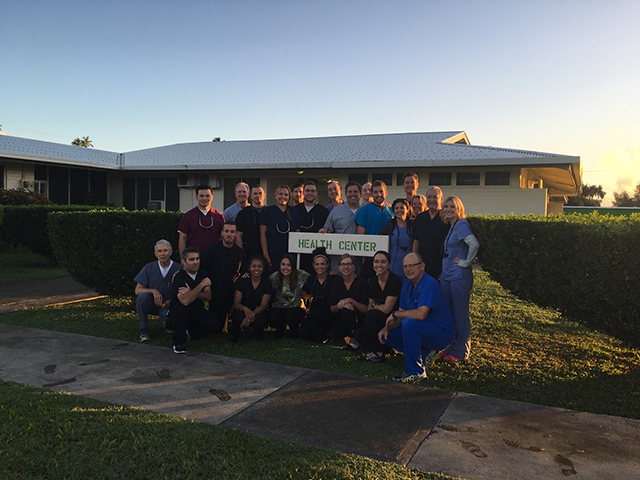Dental care in paradise
How the volunteer efforts of faculty and students from the Midwestern University College of Dental Medicine help Tongan patients.

Islands in the South Pacific seem like pieces of heaven on Earth. Perfect weather, sandy beaches and beautiful scenery all contribute to an idyllic picture of perfection. But for those who live there, there’s trouble in paradise.
A high-sugar diet and inadequate access to dental care takes its toll on the teeth of the island residents. Happily, however, students and faculty from the Midwestern University College of Dental Medicine in Glendale, Arizona, are helping the people of Tonga. Three times a year, dentists and dental students embark on a goodwill mission to provide dental care to Tongan patients.
Read more: The importance of joining a dental mission trip
The need
The Kingdom of Tonga is an archipelago in the Southern Pacific ocean composed of 169 islands, 36 of which are inhabited by 100,000 people. And for those residents, there are only 10 dentists and no dedicated dental training facilities.

Midwestern University faculty and students provide dental care to Tongan residents.
Dr. Bradford Smith, DDS, dean of the Midwestern University College of Dental Medicine, first learned about the need eight years ago.
“I was at a conference and this guy got up and says, ‘We really need help down in the South Pacific island of Tonga. There’s a tiny little high school there with a medical clinic that we think we can set up for dental,’” Dr. Smith remembers. “So, I went up to him afterwards and said, ‘Do you think dental students could go down there with faculty?’ And he said, ‘Yeah. No one’s down there.’”
Midwestern University dental staff has traveled to Tonga 25 times since, and Dr. Smith has been there for half of those visits.
“When we first got down there, there was a nurse in the medical clinic, a couple dental chairs with an X-ray unit and they used an old rice cooker to sterilize instruments,” Dr. Smith says. “Since that time, we’ve gotten donations for digital sensors from DentiMax, a laptop, we have seven chairs in the Tonga clinic, behind-the-patient delivery systems, supplies, everything.
“And now we have two different kinds of autoclaves there, so the rice cooker got to go away. Somebody probably took it and started cooking rice with it, but I don’t know if I would’ve done that,” he laughs.
Because of funding issues, the Tongans don’t have access to necessary oral health care. They’re able to bridge that gap with help not only from Midwestern University but also the Japanese, who built a nine-chair dental clinic. Since volunteer efforts began, they’ve been able to add an Australian-trained chief dental officer and oral surgeon.
“There are about seven other dentists on the island too,” Dr. Smith says. “We’ve taken CE courses down to them and helped them learn four-handed dentistry and helped them get a dental assisting program. We’ve done certification and accreditation with them. They’re kind of up and running there, but there are still a lot of people on the island who can’t even afford the extra little things. If it’s more than just an extraction, they can’t afford that, so they come to the free clinic that we still offer. We’ve been able to get a volunteer dentist down there who is available after we leave.”
The trips
Four faculty and 14 dental students from Midwestern University visit Tonga three times a year, providing a steady source of care.
“On-and-off there were volunteer dentists that would go into that area,” Dr. Smith says. “Occasionally, you get a couple of other people to go down there, but there was never any consistent care.”
Trending article: Dental care, south of the border
Care involves everything from clinical interventions to educational resources.
“Now, they have help from the Japanese, they have hygienists, they have a assistants,” Dr. Smith says. “They go into the public elementary schools and teach oral hygiene. They have a two-minute song called ‘Brusha-Brusha,’ and it’s a song that the students will brush their teeth too. They leave their toothbrushes at school, so they know that the students will brush their teeth at least once a day.”
Education is especially important because of the Tongan diet.
“There’s still a lot more education that’s needed because they have a high-sugar diet with lots of pop,” Dr. Smith says. “And their sodas down there have a high concentration of sugar. Once you get out of United States, the sugar content changes dramatically in the rest of the world.
“Occasionally, we will go out to the schools and into the local clinics-they’re small clinics with one chair,” he continues. “I believe they have 10 to 12 villages. The houses they have range from maybe a tarp over some trees to a nice block house that’s just two or three rooms. Here, they would probably go for $10,000. That’s the kind of house we’re talking about. We’ve had students that would go out to those clinics as well and they talk about chief complaints.”
Continue to page two to read more...
The care
While the educational component is important, they do the heavy lifting in the clinic.
“Mostly, in our clinic, we work anywhere from six in the morning until five at night,” Dr. Smith says. “And we treat chief complaints, we’ll do root canals, we’ll do composite fillings. We’ve even taken impressions, brought them back and scanned them, and then brought the crown back the next time after we fabricate. We will do dentures. We will do partial dentures or flippers. We’ll see 250 patients a week, and of those, we might do 60 root canals and we might make 30 flippers and 10 dentures, and then we have to do all the restorative work, fillings and extractions.”
The caregivers see a wide variety of dental problems, but there are some issues that seem to stand out.

Tongan residents sit in a waiting room in the dental clinic.
“The most common would be just broken down teeth,” Dr. Smith says. “Extraction of posterior teeth is very, very common.
“The length of the roots is another interesting phenomenon they have,” he adds. “We’ve seen, many times, where we have to use a 35-mm endodontic file to be able to finish the root canal.”
And it’s not just dental issues with which the Tongans contend.
“On the island, there’s a lot of interesting pathology that goes on,” Dr. Smith says. “One of the interesting things about the people there is that 68 percent of adults have Type 2 diabetes. That’s an issue when we’re treating because of the healing process that goes on.
We’ve seen extraoral cysts that may be three inches by two inches, which is big, like your fist sitting on the lower part of the ramus and the mandible.”
More from the author: Managing the fear factor
Paying for the care comes from a number of sources, such as donations (both monetary and in-kind) and money that Dr. Smith sets aside from his own budget. Students going on the trips must pay their own way.
“Sometimes we are able to reimburse some of that with some of these donations. But, again, it’s kind of a labor of love that everybody goes down there for,” Dr. Smith says.
“We do try to get donations from suppliers and we are always looking for donations from suppliers to bring down there,” he continues. “For instance, the big things, like chairs and delivery units, autoclaves, handpieces, sensors and laptops.”
The reward
Ultimately, what keeps Dr. Smith and the other dental healthcare professionals going back is the feeling of helping those in need.
“My interest, now, compared to the very first time I went, and the same with people who have gone repetitive times, is that the people are amazing,” Dr. Smith says. “They’re so loving, so giving, so caring and so in need of dental care. But when we go down there, the amount of dental care we give is minuscule compared to the amount of good feeling that you get from them.”

Midwestern University faculty and students stand outside a clinic in Tonga.
For all the aid that they provide, Dr. Smith says they get more out of the visits than the Tongans.
“Actually, we’re selfish,” he says. “We go down there and we get more out of the good feeling than what we give to them. So, it’s kind of addictive to go down there and get that. Obviously, we’re not on the island the whole time working, as a paid job, so you get some of that feeling of when people give of service. For everybody, that’s the main reason that we go down there.”
The Tongan trips are very popular with students and attending one is highly competitive. There’s such need, and they’re so popular, in fact, that the school increased the number of annual visits.
“When we first started, we did two trips a year-one in May and one in November-for a week each, and we had about 75 students sign up,” Dr. Smith says. “Then the committee would look at what amount of service has a student given to that point, and they would judge who got to go on the trip based on the amount of service that they’ve already rendered in other areas. Now, we have 104 spots to fill, and we can pretty much satisfy everybody who wants to go on the trips.”
The school only allows third- and fourth-year students who are in the clinical phase of their studies to go on the trips. Not surprisingly, patients welcome their volunteer caregivers, bringing gifts such as whales carved out of wood, fans and fruit.“They’ll bring us coconuts, just to say thanks,” Dr. Smith says. “They’ll lop off the top and that’s what your drinking because you’re so busy you forgot to bring a water bottle, so you just drink right out of the coconut. And they will bring us watermelon and different fruit. They’re very gracious.”
The success of the trips to Tonga has inspired the school to also visit Guatemala and Samoa. But Tonga will always have a special place in Dr. Smith’s heart.
“Tonga is sort of our baby in the South Pacific,” Dr. Smith says.
How you can help
The Midwestern University College of Dental Medicine is always looking for donations to support its trips to Tonga, Samoa and Guatemala. Dr. Cara Copeland, DMD, is the chair of the international services committee and coordinates the trips’ planning. She can be contacted at ccopel@midwestern.edu.